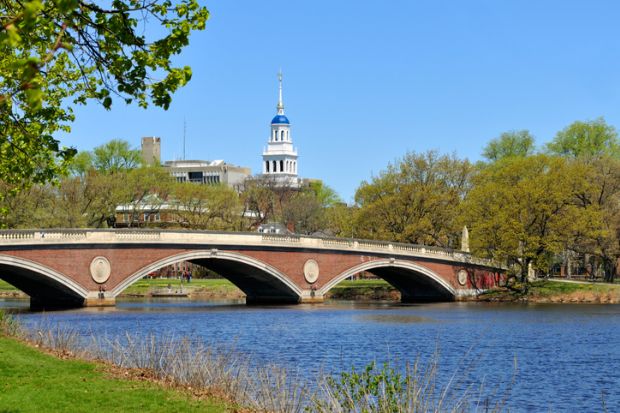The chair of Harvard University’s chemistry department, Charles Lieber, a leader in nanotechnology development, has been arrested and charged over alleged secret contractual ties to a Chinese government programme.
Professor Lieber was immediately placed on leave and banned from campus by Harvard, which called the charges “extremely serious”.
Federal prosecutors also announced unrelated charges against two Chinese nationals who had been working at Harvard and nearby Boston University and who allegedly tried to smuggle research information and materials back to China at the direction of their government.
The cases come as the Trump administration is engaged in a crackdown on what is sees as the exploitation by China and other countries of the US university research environment to steal scientific information of military and economic value.
Professor Lieber was charged with making a materially false statement, for allegedly denying or failing to fully describe an extensive research relationship he had with the Wuhan University of Technology in China.
The professor, known for discoveries in the medical use of nanoelectronics, is alleged to have cooperated with China’s state-run Thousand Talents programme for attracting and recruiting scientific talent. Prosecutors claim that he was paid more than $1.5 million (£1.2 million) by the Wuhan institution to establish a research lab in China, annual living expenses of about $158,000, and $50,000 per month in salary, but concealed such facts from Harvard and federal investigators.
Harvard said that it had placed the professor on “indefinite administrative leave” and is working with federal officials in investigating the matter. “The charges brought by the US government against Professor Lieber are extremely serious,” the university said.
Professor Lieber has been at Harvard since 1991, gathering honours that include being named a university professor.
He previously told university officials that he had “no formal association” with the Wuhan University of Technology, and that he “is not and has never been” a participant in the Thousand Talents programme, prosecutors said.
The top federal prosecutor in Massachusetts, US Attorney Andrew E. Lelling, announced the case against Professor Lieber along with the charges in unrelated cases against the two Chinese nationals.
One of the Chinese nationals, Yanqing Ye, is a member of the Chinese People’s Liberation Army who allegedly used her role as a student at Boston University to spy on US university scientists, Mr Lelling’s office said. She was interviewed last April by federal agents at Boston’s Logan airport, where officials said she admitted she was working for the Chinese military and was found to have compiled data on US military projects.
Ms Ye subsequently returned to China. A spokeswoman for Mr Lelling’s office said that she had no comment on why Ms Ye was allowed to leave the country. Boston University said in a statement that Ms Ye left the institution in April, and that BU officials “look forward to assisting” the federal investigation.
The other Chinese national, Zaosong Zheng, was a laboratory cancer researcher working at Beth Israel Deaconess Medical Center, a Harvard teaching institution.
Mr Zheng was arrested last month at Logan after his luggage was found to contain 21 vials of cancer cells, stolen from Beth Israel, that were wrapped in a plastic bag and stuffed inside a sock, prosecutors said. He had arrived in the US in August 2018 on a research-related visa sponsored by Harvard.
At Logan, Mr Zheng first lied to federal agents about the vials, then admitted he stole them to help boost his research career back in China, prosecutors said. He has been detained since then.
The Association of American Medical Colleges has said that Chinese nationals account for about half the staff at US research laboratories, largely because the salaries do not attract US workers.
The US National Institutes of Health has asked dozens of US universities to investigate some 180 Chinese nationals suspected of legal violations, in many cases involving an alleged failure to disclose financial ties to China.
Officials of the NIH and other federal agencies have acknowledged that much of US university-based research does not involve classified material, and described their crackdown in the academic arena as largely a matter of protecting taxpayer expenditures on science. They have declined, however, to outline any similar investigative efforts aimed at unauthorised disclosures or sharing of lab discoveries that do not involve foreign nationals.




